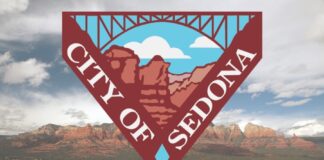Forbidden by ancient custom to sing certain songs that belonged only to the men of her tribe, Delores Plunkett watched as those songs were extinguished, taken to the grave by the diabetes and the alcohol that claimed their singers.
A member of the Yavapai-Apache Nation, Plunkett mourned this loss, and as much, the loss of that part of her tribe’s traditions among the children.
“My father’s sons died before he did,” Plunkett said. “He should have taught me the songs, but he never did.”
By Susan Johnson
Larson Newspapers
Forbidden by ancient custom to sing certain songs that belonged only to the men of her tribe, Delores Plunkett watched as those songs were extinguished, taken to the grave by the diabetes and the alcohol that claimed their singers.
A member of the Yavapai-Apache Nation, Plunkett mourned this loss, and as much, the loss of that part of her tribe’s traditions among the children.
“My father’s sons died before he did,” Plunkett said. “He should have taught me the songs, but he never did.”
Four years ago, she and a few other women decided to resurrect the songs.
“There was a Hualapai gourd singer named Keith Mahone, and we got his compact disc, started singing his songs and we’ve been at it ever since,” Plunkett said.
The compositions are in Yuman, a large linguistic family that is common among the American Indians of the Southwest.
Called bird songs, the words and music were used for many rites: before and after a journey, at funerals, in preparation for hunting elk, and to convey honor and blessings.
There are also songs for the hummingbirds which are considered good messengers in the American Indian culture.
Going against the ancient tradition that only men could sing these particular songs wasn’t the easy decision it might seem, said Plunkett who is a member of the Nation’s Cultural Center.
“Some people said that all the elders would be mad and that sickness would come to our family from it,” Plunkett said. “But, that didn’t happen.”
In fact, the male gourd singers from other tribes encouraged her group to keep performing and the elder women urged her not to stop what she had started.
An integral part of these rituals are bird dancers, girls who wear regalia comprised of beaded bodices representing the breast of a bird and capes that emulate the wings.
The girls dance in a small circle in front of the boys and men, spreading their “wings,” and dancing in graceful semi-circles that simulate the movements of a bird.
As the males sing, they are accompanied by hand-held rattles which are made from gourds that are filled with palm seeds and held by a handle fashioned of cottonwood.
Elaborately painted, each rattle is different in its design and size, with some being turquoise in color and some having images of birds and water.
“Our whole purpose is to perpetuate this custom for our grandchildren, the young boys and girls,” Plunkett explained.
Since initiating the revival, a group of 17 women and children from the tribe have performed at state-wide and national events, including the Boys and Girls Clubs of America National Conference.
Plunkett’s daughter, Delight Plunkett, recently performed as a dancer, while her grandson, Brandon Marquez, sang during the V Bar V Archaeological Fair on Saturday, May 3.
“It’s tiring, but I love it,” said Delight Plunkett, who is 19 and a graduate of Mingus Union High School. “I enjoy my culture and there aren’t many youth who know these songs, only the elders.”
Delores Plunkett will be appearing at the Sedona Heritage Museum on Saturday, May 10, at 10 a.m. to make a presentation on current tribal culture and the history of tribal traditions.
She will also discuss how grandmothers help to perpetuate traditions, skills and crafts of the Yavapai Apache Nation.
Young members of the Nation will provide a program of dance demonstrations while traditional dress will be displayed along with a display of baskets and other crafts.
The event is free and open to the public.
The Sedona Heritage Museum is located at 735 Jordan Road.
Susan Johnson can be reached at 282-7795, Ext. 129 or e-mail sjohnson@larsonnewspapers.com





